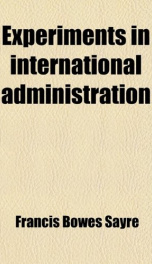experiments in international administration

Purchase of this book includes free trial access to www.million-books.com where you can read more than a million books for free. This is an OCR edition with typos. Excerpt from book: the world's peace. An international organ may have for its sole function such harmless duties as the collection of information, the preparing of statistics, or the publication of a specialized magazine; or it may have power to control the actions of great nations in matters of vital concern. In order to point out these differences, the existing international administrative organs may be roughly classified in three groups according to the nature of the power accorded to them. Type I.International Administrative Organs with little or no real power of control. The permanent bureau of the Universal Postal Union is a good example of this type. Although the Postal Union itself possesses considerable power, the only function of the permanent bureau is of an informational and ministerial character. It cannot control in any way the free exercise of sovereignty by any state. Of the same nature are the Permanent Bureau of the Union for the Protection of Industrial Property, the International Office of Public Health at Paris, the Permanent Commission of the International Institute of Agriculture, and countless others. Type II.International Executive Organs with real power of control over some local situation within a particular state or states. Organs of this type are not mere business bureaux of administration, but are governing bodies possessing the actual authority and ostensible power to exert over some local situation an international control. As might be expected, such an instrument of international control is most frequently set up in countries with inefficient or backward governments, such as Turkey, Albania, Morocco as it existed under Moorish rule, or the Congo country. The local sovereign may or may not be given representation upon the international Commission. The la...
Info about the book
Author:
Series:
Unknown
ASIN:
B0006S56IC
Rating:
3.5/5 (5)Your rating:
0/5
Languge:
English
Users who have this book
Users who want this book
What readers are saying
What do you think? Write your own comment on this book!
write a commentif you like experiments in international administration try:
Other books by this author
Do you want to exchange books? It’s EASY!
Get registered and find other users who want to give their favourite books to good hands!


